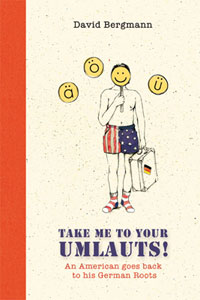www.derdiewas.de - Die Website zum Buch von David Bergmann
Navigation 1
Preview of "Take me to your Umlauts!" - page 1
("Der die was?" in English, the 3rd book.)
Chapter 2 - Germany: "Home of the Umlauts!"
It was once upon a time in the United States. A new, exclusively expensive brand of ice cream suddenly appeared on the ice cream scene. Nobody knew exactly where it had come from. There were many rumors floating around: Denmark? Holland? Iceland? Of course, Iceland's name alone would have sufficed to be an appropriate homeland for such a frozen delicacy…
The epicenter of all of this sweet speculation was the ice cream brand "Häagen Dazs". Not until much later would large swathes of the populace learn the truth about this ice cream's origin. To the disappointment of many American ice cream connoisseurs, it was revealed that the producer was just a run of the mill American from New York. Instead of originating from some Nordic language, the name was simply an artistic term which was supposed to look and sound European to the American consumers and be associated with European tradition and craftsmanship. But, by this time, it was too late: The ice cream brand's whiff of European flair could no longer be snatched away from it.
It is difficult for native English speakers to understand why umlauts aren't properly appreciated in the languages in which they appear. For example, a Swedish friend of mine from Hamburg with the last name Källner wanted to get rid of her umlaut simply because she believed that with it, her last name didn't appear international.
On the other hand, American and British hard rock bands have long been aware of the umlauts’ “cöölness”. They realize that umlauts give band names a “foreign-ish” appearance and even seem to imply a certain “mythical Germanic toughness.” The random umlaut in rock music was introduced by Blue Öyster Cult and later adopted by Motörhead and Mötley Crüe. The graphic designer who designed the cover of Motörhead’s first album created the so-called “hard-rock-umlaut”. “We did it simply because it looks nasty,” commented the singer. Supposedly, the umlauts in Mötley Crüe stemmed from the members’ favorite drink, Löwenbräu.
back - 1 - next
